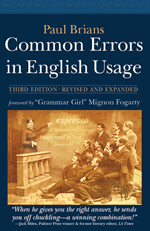“Ceremonial” and “ceremonious” are often considered synonyms, and can indeed be used interchangeably in many contexts. But there are some cases in which one is better than the other.
If you are talking about the performance of a ceremony, the word you will usually want is “ceremonial” as in “ceremonial offering,” “ceremonial garb,” or “ceremonial dance.” Sikhs traditionally wear ceremonial daggers.
“Ceremonious” is mostly used to describe formal behavior which often has little or no connection with a literal ceremony: “ceremonious manners,” “ceremonious welcome,” or “ceremonious speech.”
Back to list of errors

BUY THE BOOK!
